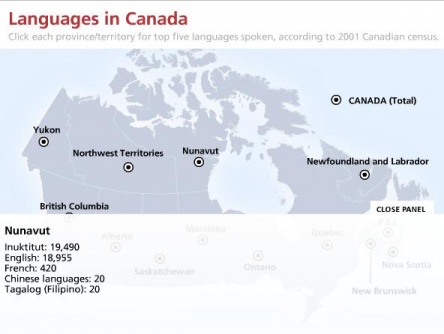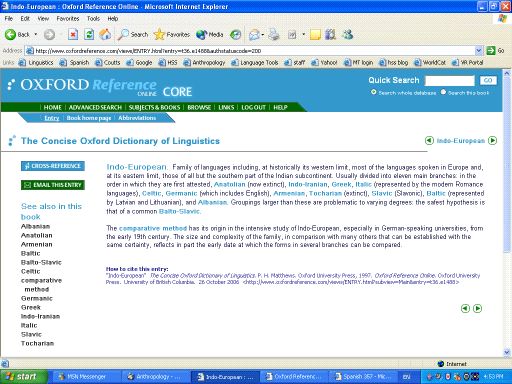November 8th, 2006 by Susan Atkey | No Comments »
Check out this interactive language map of Canada, produced by the CBC. Click on a province to display the top 5 languages spoken at home for each province and territory of Canada, according to the 2001 census. BC’s top five? English (3,521,730); Chinese languages (208,080); Punjabi (125,920); French (53,615); and Tagalog, or Filipino (37,830).
Nunavut’s numbers give an interesting snapshot of the area:
– Inuktitut speakers outnumber English speakers, and,
– Chinese language speakers and Tagalog (Filipino) speakers are tied for 4th place with 20 speakers each.

If you’re looking for more detailed information on the languages of Canada, you can try Stats Canada Census 2001 Topic Based Tabulations and look for #6 in the list, Language Composition of Canada. Tables include:
Detailed Mother Tongue
Language Spoken Most Often at Home
Knowledge of Official Languages
Various Languages Spoken
These tables provide a comprehensive breakdown of languages by a wide range of variables such as age, gender, education, and income. If you use the 20/20 software that StatsCan provides, you can pull out the data for just the variables you are interested in (rather than looking at all the provinces or all languages, for example).
Statistical data can be challenging, so if you’re having trouble pulling out the numbers you need, please come down to the Koerner Library reference desk (2nd floor) and chat with a librarian. (Or contact me directly; details at the top left.)
Posted in Electronic Resources, In the News | No Comments »
September 6th, 2006 by Susan Atkey | 1 Comment »
Oxford Dictionary of Lingustics is an excellent source for looking up new terms and unfamiliar concepts in Linguistics. No need to come to the library – this eBook is available to UBC students, faculty and staff from the comfort of home or office via the web.
Short, clear entries each end with a ready-made citation to the entry.. For example, here’s the entry on Indo-European
:

Note the handy “how to cite this entry” section towards the bottom. Just copy and paste into your bibliography or reference list!
Bookmark the dictionary now! Or just look it up in the library catalogue when you need it. The quickest path is: www.library.ubc.ca > Find –> Title –> dictionary of linguistics electronic resource, then follow the link.
Posted in Electronic Resources | 1 Comment »
August 29th, 2006 by Susan Atkey | No Comments »
RefWorks is a web based citation management tool that the UBC Library licensed in April 2005.

Starting in August 2006, the UBC Library will have access to the add on module, RefShare. RefShare provides a quick and easy way to share references with others at UBC and globally with researchers who have internet access. RefShare creates of a website for the RefWorks database or folders and allows users to search, export references and/or create bibliographies. The website can be shared on a centrally created RefWorks webpage, posted on a particular website or in WebCt and/or sent to a specific group or person by email.
For more information and instructions on using RefShare, visit the RefWorks Help Guide and click on RefShare.Some uses of RefShare
-post reading lists on a course website (the UBCeLink will also appear and be accessible for UBC students, faculty and staff)
-share a RefWorks database for collaboration with researchers at both UBC or at other institutions
-share a RefWorks database of research done by UBC faculty
View some of the examples of UBC RefShare Databases and Folders
Contact me if you’d like a demo of how RefWorks and RefShare can help you manage and share your research and citations.
Posted in Electronic Resources | No Comments »



